|
|
|
Sort Order |
|
|
|
Items / Page
|
|
|
|
|
|
|
| Srl | Item |
| 1 |
ID:
153566
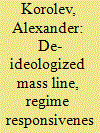

|
|
|
|
|
| Summary/Abstract |
Once the primary method of revolutionary leadership, the “mass line”
has reemerged in today’s China as a method of public policy making.
Th is study explores and theorizes the implications of mass-line tactics
in policy making and state-society relations in contemporary China. At
the theoretical level, it argues that the de-ideologized mass line in
combination with traditional forms of nonmobilized participation can
enhance government responsiveness to the broader public interest. Th e
mass line can complement traditional forms of voluntary participation
in that it can allow better representation of social groups who regularly
fail to articulate their needs through the existing participation mechanisms
and who therefore remain outside of the policy-making process.
Empirically, the paper draws on existing Chinese studies, official
document analysis, and unstructured interviews with Chinese
academics to provide examples for the theoretical argument. Th is study
analyzes the workings of the mass-line tactics in China during the New
Healthcare Reform and the formation of the 12th Five-Year Plan. If
implemented not as a propaganda tool but as a mechanism of interest
articulation and aggregation, the mass line has the potential to off er
China alternative routes of democratization.
|
|
|
|
|
|
|
|
|
|
|
|
|
|
|
|
| 2 |
ID:
153570
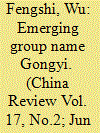

|
|
|
|
|
| Summary/Abstract |
Contestation and mutual infl uence between the state and civil society
go beyond formal institutional realms, and extend into the ideational
spheres of social labeling, public speech, and collective consciousness
building. Based on data from a three-year research project, this article
analyzes Chinese activists and nongovernmental organization (NGO)
practitioners’ preferences for group identity, and fi nds “gongyi zuzhi”
(public interest organization) to be the most popular social label. Th e
article thus argues that if there exists a collective sense of belonging
among activists and NGO practitioners in China’s civil society, the
discursive contour of this sense of belonging is most likely to be “for
public interest.” The article further maps out possible associations
between one’s NGO-related work experience and refl ections on group
identity. “Gongyi” as a shared social label may not be politically
inspiring to some, but it carries a straightforward message of “working
for the public good” and discursive potential for meaning making. Th is
fi nding suggests not only society’s embeddedness and activists’ pragmatism,
but also maturing collective consciousness and discursive
autonomy in China’s civil society
|
|
|
|
|
|
|
|
|
|
|
|
|
|
|
|
| 3 |
ID:
153565
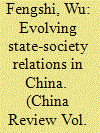

|
|
|
|
|
| Summary/Abstract |
This special volume attempts to enhance the understanding of a seemingly
paradoxical pair of patterns in contemporary Chinese politics,
namely, the resilience of the Communist regime and the robustness of
social autonomy. Th e papers, while contributing to the central theme
from different sectors/subfields, converge on the aspect where the
agencies of the Chinese state and the society interact and exert infl uence
on each other. Instead of simply giving away summaries and revealing
intricate findings, this introduction focuses on the overall scope and
shared analytical perspective of all the papers included, and the interlinkages
across them in order to facilitate the reading of the whole volume.
|
|
|
|
|
|
|
|
|
|
|
|
|
|
|
|
| 4 |
ID:
153571
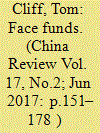

|
|
|
|
|
| Summary/Abstract |
In semi-industrialized rural China, villagers are getting together to
create their own micro welfare state. In response to inadequate state
support for the poor, disabled, and especially elderly of the village,
entrepreneurs form rotating credit associations and underground banks
that fi nance welfare schemes exclusively for those who hold a household
residency ( 戶口 hukou) in their village. Most of these schemes eschew
any formal engagement with the state, but where money, legitimacy,
and social stability are involved, the state is never far away. Th is paper
examines the development and propagation of these highly successful
nonstate welfare funds in parallel to the seminally unsuccessful state
eff orts at encouraging philanthropy, and reports on recent state eff orts
to co-opt and control this flourishing, indirectly contentious, civil
movement. Th e fairly gentle nature of state-society interactions to date
shrouds an implicit contest over political space at the grassroots level.
|
|
|
|
|
|
|
|
|
|
|
|
|
|
|
|
| 5 |
ID:
153568


|
|
|
|
|
| Summary/Abstract |
This paper concerns religious charity, a phenomenon that has reemerged
as Chinese religious life has revived and expanded. Such charity
off ers a number of potential benefi ts to the party-state, but it also challenges
regime eff orts to limit the spread and public profi le of religion.
Religious charity is regarded as relatively compatible with the regime’s
secularizing ambitions in that it focuses adherents’ attention on the
problems of this world rather than on salvation in the next. Yet many
faith-based philanthropic endeavors are forms of religious practice and
expression in their own right, such as the two examples examined in
this paper—the Gansu Province Association for Minority Nationality
Cultural and Educational Promotion and the Gospel Rehab in Yunnan.
By melding religiosity and public service, adherents sacralize the locations
and activities of charity, bringing religion into spaces from which
the party-state tries to exclude it. Charity thus enables religion to spill
over its designated boundaries, enter the public square, and infuse even
some institutions and organizations of the party-state itself.
|
|
|
|
|
|
|
|
|
|
|
|
|
|
|
|
| 6 |
ID:
153567
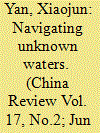

|
|
|
|
|
| Summary/Abstract |
In the wake of the global economic crisis of 2008, the Chinese state has
enhanced its systematic eff orts to rebuild Communist Party branches in
private enterprises. Th is article examines such eff orts with specifi c reference
to the campaign initiated in 2012 in Anhui province, one of the
most recent initiatives undertaken by the party-state to infi ltrate the
country’s huge and still-growing private sector. Th e article examines the
emerging and dynamic institutional links between provincial party-state
apparatus and local private businesses in Anhui and highlights the four
key methods used by the Chinese Communist Party (CCP) to extend
its control over the increasingly powerful and infl uential private sector.
Th ese mechanisms are establishing new offi cial institutions to coordinate
CCP aff airs related to the private sector, “sending down” a group
of “party-building instructors,” rewarding private business elites with
appointments to party positions, and reorienting the work of local party
organs to better serve the needs of the private sector. Although this
business-oriented party building has indeed made the CCP more
relevant to private business development and thus increased its organizational
presence, it remains unclear whether these eff orts have genuinely
strengthened the Communist Party’s control of the private sector.
|
|
|
|
|
|
|
|
|
|
|
|
|
|
|
|
| 7 |
ID:
153572


|
|
|
|
|
| Summary/Abstract |
Using riot police to break up a big demonstration is a familiar occurrence
in many parts of the world, including China. But all protest
control does not involve the use of force, nor is repression always
directed at large groups of people assembled in one location. Some
repression rests on psychological rather than physical coercion and is
aimed at individuals, often in their homes or nearby. This type of
repression may be carried out by people with only a loose connection
to the state’s coercive apparatus, such as relatives, friends, or neighbors
of the target who work for the government or receive benefi ts from it.
“Relational repression” is labor intensive and a sign of a high-capacity
state that uses multiple levers to suppress contention, but has limited
reach and remains insecure about its ability to maintain social stability.
It builds on Maoist and dynastic techniques of control and aims to
extend state penetration into a marketized society whose members have increasingly emancipated themselves from direct dependence on the
government. Relational repression oft en alienates both the agents of
repression and their targets. But it can, at times, be eff ective in demobilizing
resistance or preventing a person from taking part in protest.
|
|
|
|
|
|
|
|
|
|
|
|
|
|
|
|
| 8 |
ID:
153569


|
|
|
|
|
| Summary/Abstract |
China scholars have consistently described China’s private entrepreneurs
as politically co-opted by the Communist Party regime. Since
China’s economic development now overwhelmingly depends on the
performance of the private sector, the political dynamics and power
confi gurations within the current regime coalition between state and
business may have seen change over the past decade. Drawing on the
recent literature on state-business relations and fi eldwork conducted in
diff erent provinces, cities, and counties since 2012, this paper hypothesizes
that private entrepreneurs are a “strategic group” in Chinese
politics. By working through the multidimensional networks that crisscross
diff erent party-state units, administrative levels, and formal institutions
such as business associations and local parliamentary bodies all
over the country, private entrepreneurs act collectively, albeit in (as yet)
uncoordinated ways. By looking closely at the evolving governmentbusiness
nexus in China’s local state, this article sheds new light on
private entrepreneurs’ strategic action in China’s political system and
highlights that private entrepreneurs are increasingly infl uential within
the existing regime coalition.
|
|
|
|
|
|
|
|
|
|
|
|
|
|
|
|
|
|
|
|
|